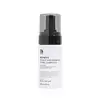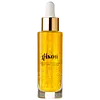What's inside
What's inside
 Key Ingredients
Key Ingredients

 Benefits
Benefits

 Concerns
Concerns

 Ingredients Side-by-side
Ingredients Side-by-side

Lactobacillus/Leaf Ferment Filtrate 60%
Skin ConditioningWater
Skin ConditioningButylene Glycol
HumectantSaccharomyces Cerevisiae Extract
Skin Conditioning1,2-Hexanediol
Skin ConditioningEcklonia Cava Extract
Skin ConditioningC12-13 Alketh-9
EmulsifyingGlycerin
HumectantPropanediol
SolventPanthenol
Skin ConditioningPolyglyceryl-10 Laurate
Skin ConditioningArginine
MaskingNiacinamide
SmoothingAllantoin
Skin ConditioningBetaine Salicylate
AntimicrobialCaffeine
Skin ConditioningHydrolyzed Silk
HumectantCoptis Japonica Root Extract
Skin ConditioningMorus Alba Bark Extract
Skin ConditioningSophora Flavescens Root Extract
AntioxidantScutellaria Baicalensis Root Extract
AstringentSodium Phytate
Alteromonas Ferment Extract
Skin ConditioningGlycine
BufferingBetaine
HumectantPalmitoyl Tripeptide-5
Skin ConditioningAcetyl Hexapeptide-8
HumectantHouttuynia Cordata Extract
Skin ConditioningCamellia Sinensis Leaf Extract
AntimicrobialPerilla Frutescens Leaf Extract
MaskingGlycine Max Seed Extract
Skin ConditioningPolyglyceryl-10 Stearate
Skin ConditioningSerine
MaskingGlutamic Acid
HumectantAspartic Acid
MaskingLeucine
Skin ConditioningAlanine
MaskingLysine
Skin ConditioningTyrosine
MaskingPhenylalanine
MaskingValine
MaskingThreonine
Proline
Skin ConditioningIsoleucine
Skin ConditioningBiotin
AntiseborrhoeicHistidine
HumectantCysteine
AntioxidantMethionine
Skin ConditioningSodium Ascorbyl Phosphate
AntioxidantBeta-Glucan
Skin ConditioningFolic Acid
Skin ConditioningPyridoxine
Skin ConditioningTocopherol
AntioxidantCyanocobalamin
Skin ConditioningBeta-Carotene
Skin ConditioningLinoleic Acid
CleansingThiamine Hcl
MaskingRiboflavin
Cosmetic ColorantMenthol
MaskingMenthyl Lactate
MaskingEthylhexylglycerin
Skin ConditioningCitric Acid
BufferingSodium Citrate
BufferingHydrogenated Lecithin
EmulsifyingCaprylyl Glycol
EmollientMelaleuca Alternifolia Leaf Oil
AntioxidantMentha Piperita Oil
MaskingParfum
MaskingLactobacillus/Leaf Ferment Filtrate 60%, Water, Butylene Glycol, Saccharomyces Cerevisiae Extract, 1,2-Hexanediol, Ecklonia Cava Extract, C12-13 Alketh-9, Glycerin, Propanediol, Panthenol, Polyglyceryl-10 Laurate, Arginine, Niacinamide, Allantoin, Betaine Salicylate, Caffeine, Hydrolyzed Silk, Coptis Japonica Root Extract, Morus Alba Bark Extract, Sophora Flavescens Root Extract, Scutellaria Baicalensis Root Extract, Sodium Phytate, Alteromonas Ferment Extract, Glycine, Betaine, Palmitoyl Tripeptide-5, Acetyl Hexapeptide-8, Houttuynia Cordata Extract, Camellia Sinensis Leaf Extract, Perilla Frutescens Leaf Extract, Glycine Max Seed Extract, Polyglyceryl-10 Stearate, Serine, Glutamic Acid, Aspartic Acid, Leucine, Alanine, Lysine, Tyrosine, Phenylalanine, Valine, Threonine, Proline, Isoleucine, Biotin, Histidine, Cysteine, Methionine, Sodium Ascorbyl Phosphate, Beta-Glucan, Folic Acid, Pyridoxine, Tocopherol, Cyanocobalamin, Beta-Carotene, Linoleic Acid, Thiamine Hcl, Riboflavin, Menthol, Menthyl Lactate, Ethylhexylglycerin, Citric Acid, Sodium Citrate, Hydrogenated Lecithin, Caprylyl Glycol, Melaleuca Alternifolia Leaf Oil, Mentha Piperita Oil, Parfum
Water
Skin ConditioningPropanediol
SolventCoco-Caprylate/Caprate
EmollientBetaine
HumectantCaprylic/Capric Triglyceride
MaskingPentylene Glycol
Skin ConditioningMel
EmollientPropolis Cera
AntiseborrhoeicLimnanthes Alba Seed Oil
Skin ConditioningVitis Vinifera Seed Oil
EmollientCarthamus Tinctorius Seed Oil
MaskingHelianthus Annuus Seed Oil
EmollientHydrolyzed Pea Protein
EmollientHydrolyzed Vegetable Protein
Skin ConditioningHippophae Rhamnoides Oil
EmollientOenothera Biennis Oil
EmollientRosa Canina Fruit Oil
EmollientTocopherol
AntioxidantCalendula Officinalis Flower Extract
MaskingHelianthus Annuus Sprout Extract
Skin ConditioningCaesalpinia Spinosa Fruit Pod Extract
Daucus Carota Sativa Root Extract
Skin ConditioningCitrus Aurantium Bergamia Fruit Extract
Skin ConditioningParfum
MaskingCastor Oil/Ipdi Copolymer
Maltodextrin
AbsorbentAcrylates/C10-30 Alkyl Acrylate Crosspolymer
Emulsion StabilisingChlorphenesin
AntimicrobialCarbomer
Emulsion StabilisingSodium Hydroxide
BufferingTrisodium Ethylenediamine Disuccinate
Acacia Senegal Gum
MaskingXanthan Gum
EmulsifyingTamarindus Indica Seed Gum
Emulsion StabilisingPotassium Sorbate
PreservativeSodium Benzoate
MaskingGlucose
HumectantCI 40800
Cosmetic ColorantLimonene
PerfumingLinalool
PerfumingHexyl Cinnamal
PerfumingCoumarin
PerfumingWater, Propanediol, Coco-Caprylate/Caprate, Betaine, Caprylic/Capric Triglyceride, Pentylene Glycol, Mel, Propolis Cera, Limnanthes Alba Seed Oil, Vitis Vinifera Seed Oil, Carthamus Tinctorius Seed Oil, Helianthus Annuus Seed Oil, Hydrolyzed Pea Protein, Hydrolyzed Vegetable Protein, Hippophae Rhamnoides Oil, Oenothera Biennis Oil, Rosa Canina Fruit Oil, Tocopherol, Calendula Officinalis Flower Extract, Helianthus Annuus Sprout Extract, Caesalpinia Spinosa Fruit Pod Extract, Daucus Carota Sativa Root Extract, Citrus Aurantium Bergamia Fruit Extract, Parfum, Castor Oil/Ipdi Copolymer, Maltodextrin, Acrylates/C10-30 Alkyl Acrylate Crosspolymer, Chlorphenesin, Carbomer, Sodium Hydroxide, Trisodium Ethylenediamine Disuccinate, Acacia Senegal Gum, Xanthan Gum, Tamarindus Indica Seed Gum, Potassium Sorbate, Sodium Benzoate, Glucose, CI 40800, Limonene, Linalool, Hexyl Cinnamal, Coumarin
Ingredients Explained
These ingredients are found in both products.
Ingredients higher up in an ingredient list are typically present in a larger amount.
Betaine is a common humectant (a substance that promotes retention of moisture). It's known to be gentle on the skin and can help balance hydration.
This ingredient is best for improving hydration and soothing irritated skin. Studies also show it helps even out skin tone.
Fun fact: Betaine is naturally created in the skin and body. The kind found within cosmetic products can be either plant-derived or synthetic.
Another name for betaine is trimethylglycine.
Learn more about BetaineParfum is a catch-all term for an ingredient or more that is used to give a scent to products.
Also called "fragrance", this ingredient can be a blend of hundreds of chemicals or plant oils. This means every product with "fragrance" or "parfum" in the ingredients list is a different mixture.
For instance, Habanolide is a proprietary trade name for a specific aroma chemical. When used as a fragrance ingredient in cosmetics, most aroma chemicals fall under the broad labeling category of “FRAGRANCE” or “PARFUM” according to EU and US regulations.
The term 'parfum' or 'fragrance' is not regulated in many countries. In many cases, it is up to the brand to define this term.
For instance, many brands choose to label themselves as "fragrance-free" because they are not using synthetic fragrances. However, their products may still contain ingredients such as essential oils that are considered a fragrance by INCI standards.
One example is Calendula flower extract. Calendula is an essential oil that still imparts a scent or 'fragrance'.
Depending on the blend, the ingredients in the mixture can cause allergies and sensitivities on the skin. Some ingredients that are known EU allergens include linalool and citronellol.
Parfum can also be used to mask or cover an unpleasant scent.
The bottom line is: not all fragrances/parfum/ingredients are created equally. If you are worried about fragrances, we recommend taking a closer look at an ingredient. And of course, we always recommend speaking with a professional.
Learn more about ParfumPropanediol is an all-star ingredient. It softens, hydrates, and smooths the skin.
It’s often used to:
Propanediol is not likely to cause sensitivity and considered safe to use. It is derived from corn or petroleum with a clear color and no scent.
Learn more about PropanediolTocopherol (also known as Vitamin E) is a common antioxidant used to help protect the skin from free-radicals and strengthen the skin barrier. It's also fat soluble - this means our skin is great at absorbing it.
Vitamin E also helps keep your natural skin lipids healthy. Your lipid skin barrier naturally consists of lipids, ceramides, and fatty acids. Vitamin E offers extra protection for your skin’s lipid barrier, keeping your skin healthy and nourished.
Another benefit is a bit of UV protection. Vitamin E helps reduce the damage caused by UVB rays. (It should not replace your sunscreen). Combining it with Vitamin C can decrease sunburned cells and hyperpigmentation after UV exposure.
You might have noticed Vitamin E + C often paired together. This is because it is great at stabilizing Vitamin C. Using the two together helps increase the effectiveness of both ingredients.
There are often claims that Vitamin E can reduce/prevent scarring, but these claims haven't been confirmed by scientific research.
Learn more about TocopherolWater. It's the most common cosmetic ingredient of all. You'll usually see it at the top of ingredient lists, meaning that it makes up the largest part of the product.
So why is it so popular? Water most often acts as a solvent - this means that it helps dissolve other ingredients into the formulation.
You'll also recognize water as that liquid we all need to stay alive. If you see this, drink a glass of water. Stay hydrated!
Learn more about Water